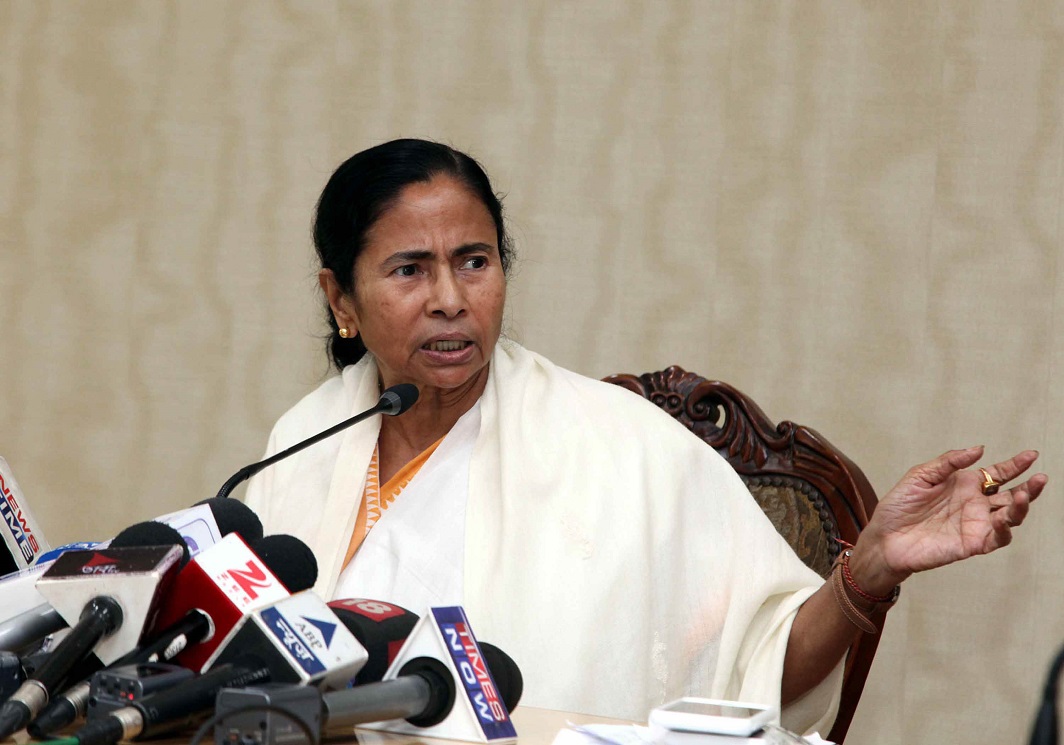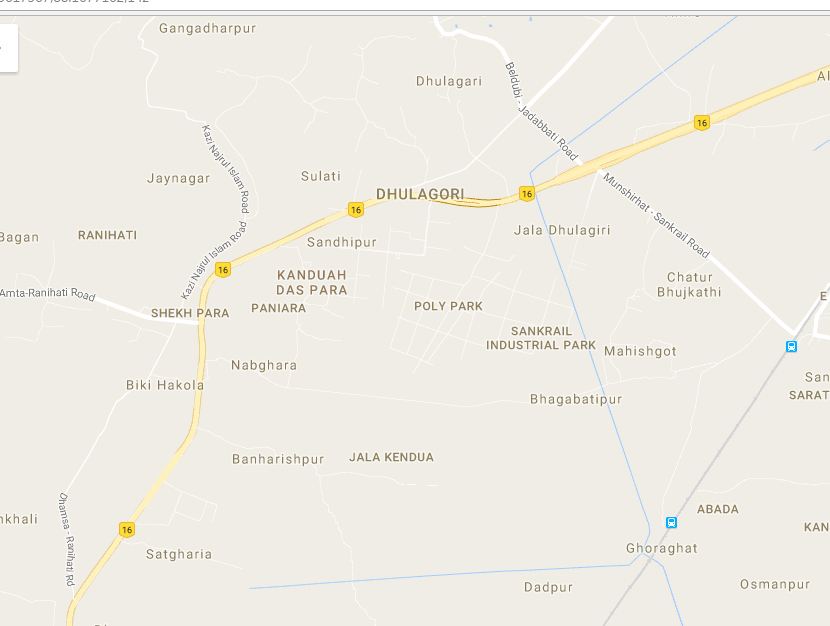
Is dirty politics muddying waters in this so far insignificant Bengal town?
By Sujit Bhar
Barely 28 km from Kolkata is the town of Dhulagarh in Howrah district, which was relatively an unimportant district outpost. However, December 12 changed it all when its peace was shattered all of a sudden. Wielding arms and bombs, hundreds belonging to a minority community stormed into an area populated by the majority spreading panic as they looted and burned houses. Almost 60 families were devastated with the assault. Many were injured.
It all triggered off after a procession was taken out to celebrate Eid-ul-Nabi or Prophet Muhammad’s birth anniversary. Simultaneously, there was also a puja happening in an adjoining temple. Sparks of arguments allegedly flew there leading to a clash.
The trouble festered and persisted for three days. Sources say that even the police force could not enter the area as they were being fire-bombed. When they finally managed to enter, they arrested around 40 of the miscreants but the incident was quickly hushed up.

QUICK TRANSFERS
The district’s Superintendent of Police (SP, Howrah Rural) Sabyasachi Raman Mishra, appointed a fortnight ago, was quickly transferred as SRP (State Reserve Police), Sealdah. Sumit Kumar, who was DC traffic, Howrah Police, was named to replace Mishra.
A government release said the transfers were made “in the interest of public service”. No details were available, but as of now there was little to suggest that a full-fledged investigation would happen.
A senior security official in the security setup, familiar with the state’s system, ominously said: “I am not sure why he was shifted, was it because of inaction, or was it because he actually did want to take action?”
A local resident of the area said: “This has never happened before. We all know the people who did it and there was hardly any instigation. Even Nabi Day (Eid-ul-Nabi) had received little attention in this area in the past. A ‘peace-march’ was taken out—more of a huge motorcycle rally, with people armed to the teeth—and they were carrying Trinamool Congress (TMC) flags.”
The incident created a lot of tension and fear among residents. However, the overall reason for the sudden outburst is covered in a shroud of mystery.
DEMONETISATION EFFECT?
It has been a policy of the Mamata Banerjee government and her TMC to elicit the support of minorities. Minorities in West Bengal add up to an average of 30 percent, but it goes up to even 70-80 percent in the north-eastern districts. The “explosive” growth in minority population has been aided through indiscriminate infiltration through the Bangladesh border and this has been accepted by all political parties as well as the intelligence branch of the security forces.
The situation there is very serious and the ruling party’s minority cell is actively complicit in the riots.
— Sidharth Nath Singh, BJP national secretary
While the erstwhile CPI(M) government used a slew of methods to control this fast-growing demographic by providing jobs, paid party cadres for the work they do and the syndicate system that controls all supplies to realtors, the TMC has not been able to set up a foolproof method to control such fringe elements.
A senior official said: “What the TMC was doing was dole out raw cash. While this never let the flames come out of the ash-pile, the embers remained hot and burning. With demonetisation, this source of raw cash vanished. There was no way such methods of appeasement could last any more. This incident, in itself could just be a reminder to the administration that more were to come if the money supply was not reinstated.”
This may be a strong reason for the incident. However, there could well be another side of the story. The attack on 60 houses resulted in 25 injuries, none of them fatal. While property was destroyed, there was seemingly a method to it all, according to a TMC insider, who did not want to be named, because he believes his chief minister was the only person to give a right interpretation.
This is the critical issue. If political parties are really bent on fishing in these troubled and highly stormy waters, there has to come a time when the dam will break.
—A senior security official
“Think of the timing of the incident,” he said. “It was immediately after Didi went out openly blaming the prime minister for destroying the poor through demonetisation. If there was no money, who financed the arms and bombs of the miscreants? Also, look at the immediate reactions to the incident from the BJP.”
POLITICAL BLAMEGAME
BJP national secretary Sidharth Nath Singh (in charge of West Bengal) was reported saying: “The situation there is very serious and the ruling party’s minority cell is actively complicit in the riots… These are also areas where the BJP has been getting traction, and where our workers are also being physically intimidated.” The BJP’s intends to move the National Human Rights Commission (NHRC) over the issue.”
The attack on 60 houses resulted in 25 injuries, none of them fatal. While property was destroyed, there was seemingly a method to it all, according to a TMC insider, who did not want to be named, because he believes his chief minister was the only person to give a right interpretation.
Quoting one of the victims, a TMC insider says: It would seem the administration failed, but look at the way things panned out. A small town, where everybody knows each other, is suddenly separated by religion and a festival, obscure in the area, is blown out of proportion, resulting in a clash between people who were friends the day before. What does this tell you? The BJP financed and stage-managed the entire issue.”
A victim said: “We have nothing left. Our home has been destroyed and there is nothing left to feed our children. We are starving. There were cylinders blasts. Houses were burning. Now, we have no other option but to stay with a relative.
“The finance angle has some traction. There is no loose money in the administration to throw into such activity. “The BJP, on the other hand, had been able to keep a huge amount of cash at hand, knowing fully well about the demonetisation plan of the PM,” said the TMC insider.

The problem seems to have a similarity with the “riots” that broke out in the Kaliachak area of the Malda district on January 3. The chief minister was quiet for a long while, before dismissing it as a law and order situation, which it was, being the outburst of mafia poppy growers’ crop being destroyed by the excise department. Following initial arrests, there was little action taken.
This particular area may have been a quieter one, but according to the official, “the rural area of the district has seen skirmishes in the past. Howrah is in two parts: the commissionerate and rural Howrah. The rural area has always remained in disquiet and it would be natural for political parties to try and fish in these troubled waters. This can have scary consequences.”
The problem seems to have a similarity with the “riots” that broke out in the Kaliachak area of the Malda district on January 3. The chief minister was quiet for a long while, before dismissing it as a law and order situation, which it was, being the outburst of mafia poppy growers’ crop being destroyed by the excise department. Following initial arrests, there was little action taken.
It may be recalled that state Pradesh Congress Committee President Adhir Chowdhury had tried to visit the area after the incident but was prevented from entering the area by security forces, citing prohibitory orders.
TRACKING THE MONEY TRAIL
Whatever the reason, it all boils down to money, or the unavailability of it. The mystery is in how the miscreants managed to get the money to arm themselves and carry out this onslaught. Now there is talk of the minorities losing faith in the Mamata Banerjee administration. “Probably that was the aim and purpose of this entire exercise,” said the TMC insider.
The argument on the other side is as follows: “With the advent of Mamata, the number of madrasas in the state has seen an explosive increase, says a political observer who has no BJP leanings, but is a keen follower of politics in the state. There is influence of Furfura Sharif, he says which is a village in Jangipara, in the adjacent district of Hooghly and is a holy place for Muslims. It has immense clout, both politically and financially, regarding the minorities of the state.
Furfura Sharif is not only influential; it is also rich in funds coming in from different sources. In 2014, just before the Lok Sabha polls, Ibrahim Siddiqui and Kasem Siddiqui — descendants of the founders of the Furfura Sharif – had attacked Mamata and the TMC at a press conference, saying the administration had “let loose a reign of terror against those who spoke against the party”. Their angst was that the chief minister had promised a lot for the Muslims of the state but had fulfilled none. They even claimed that they were beaten up by TMC leaders.
Points out a senior security official: “This is the critical issue. If political parties are really bent on fishing in these troubled and highly stormy waters, there has to come a time when the dam will break. The resulting conflict will be difficult to contain, said the senior security official. As I have said before, these areas have the potential of developing into another Kashmir, when the situation would be beyond political and diplomatic negotiations. What happens then?”
Lead picture: The charred remains of a living room of a house in Dhulagarh after the December 12 riots. Photo: YouTube

